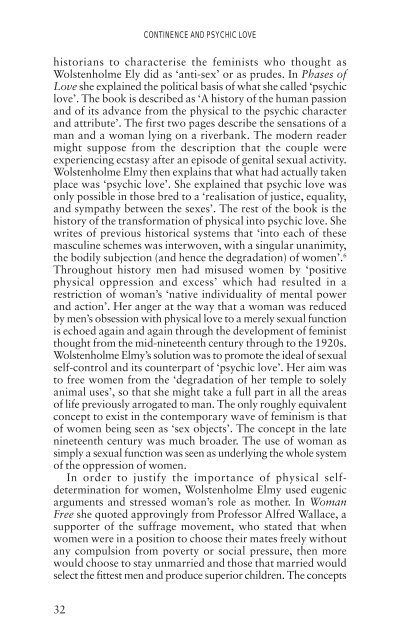The Spinster and Her Enemies - Feminish
The Spinster and Her Enemies - Feminish
The Spinster and Her Enemies - Feminish
You also want an ePaper? Increase the reach of your titles
YUMPU automatically turns print PDFs into web optimized ePapers that Google loves.
CONTINENCE AND PSYCHIC LOVE<br />
historians to characterise the feminists who thought as<br />
Wolstenholme Ely did as ‘anti-sex’ or as prudes. In Phases of<br />
Love she explained the political basis of what she called ‘psychic<br />
love’. <strong>The</strong> book is described as ‘A history of the human passion<br />
<strong>and</strong> of its advance from the physical to the psychic character<br />
<strong>and</strong> attribute’. <strong>The</strong> first two pages describe the sensations of a<br />
man <strong>and</strong> a woman lying on a riverbank. <strong>The</strong> modern reader<br />
might suppose from the description that the couple were<br />
experiencing ecstasy after an episode of genital sexual activity.<br />
Wolstenholme Elmy then explains that what had actually taken<br />
place was ‘psychic love’. She explained that psychic love was<br />
only possible in those bred to a ‘realisation of justice, equality,<br />
<strong>and</strong> sympathy between the sexes’. <strong>The</strong> rest of the book is the<br />
history of the transformation of physical into psychic love. She<br />
writes of previous historical systems that ‘into each of these<br />
masculine schemes was interwoven, with a singular unanimity,<br />
the bodily subjection (<strong>and</strong> hence the degradation) of women’. 6<br />
Throughout history men had misused women by ‘positive<br />
physical oppression <strong>and</strong> excess’ which had resulted in a<br />
restriction of woman’s ‘native individuality of mental power<br />
<strong>and</strong> action’. <strong>Her</strong> anger at the way that a woman was reduced<br />
by men’s obsession with physical love to a merely sexual function<br />
is echoed again <strong>and</strong> again through the development of feminist<br />
thought from the mid-nineteenth century through to the 1920s.<br />
Wolstenholme Elmy’s solution was to promote the ideal of sexual<br />
self-control <strong>and</strong> its counterpart of ‘psychic love’. <strong>Her</strong> aim was<br />
to free women from the ‘degradation of her temple to solely<br />
animal uses’, so that she might take a full part in all the areas<br />
of life previously arrogated to man. <strong>The</strong> only roughly equivalent<br />
concept to exist in the contemporary wave of feminism is that<br />
of women being seen as ‘sex objects’. <strong>The</strong> concept in the late<br />
nineteenth century was much broader. <strong>The</strong> use of woman as<br />
simply a sexual function was seen as underlying the whole system<br />
of the oppression of women.<br />
In order to justify the importance of physical selfdetermination<br />
for women, Wolstenholme Elmy used eugenic<br />
arguments <strong>and</strong> stressed woman’s role as mother. In Woman<br />
Free she quoted approvingly from Professor Alfred Wallace, a<br />
supporter of the suffrage movement, who stated that when<br />
women were in a position to choose their mates freely without<br />
any compulsion from poverty or social pressure, then more<br />
would choose to stay unmarried <strong>and</strong> those that married would<br />
select the fittest men <strong>and</strong> produce superior children. <strong>The</strong> concepts<br />
32

















